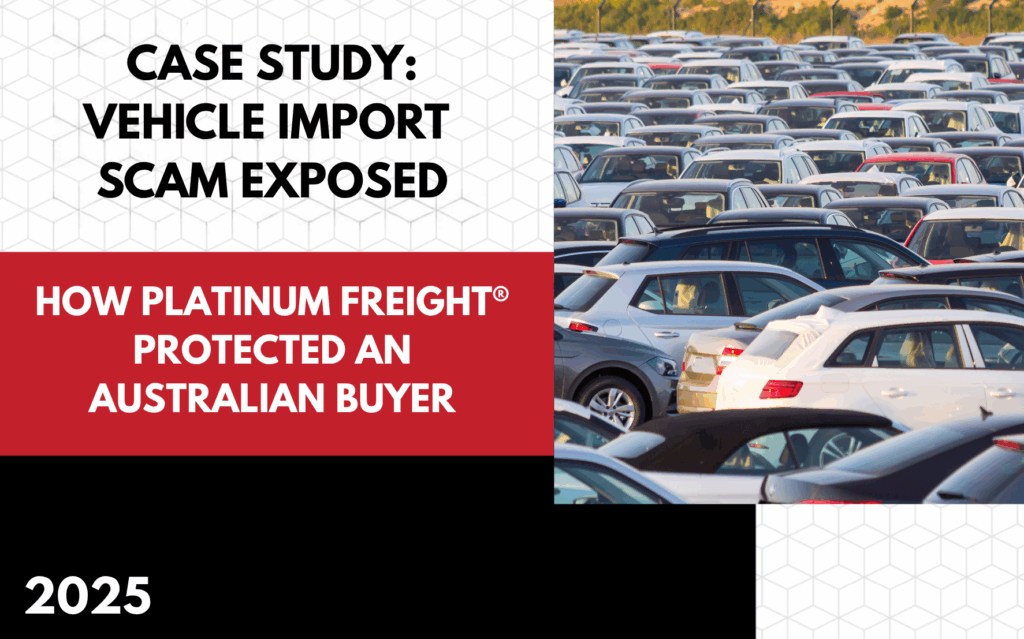
How Platinum Freight® Protected an Australian Buyer
When an Australian car enthusiast found what seemed to be a great deal on a vehicle from the United States, everything appeared legitimate. The sellers provided detailed photos, an Australian import permit, and a promise of fast and safe delivery.
He transferred the funds, and he was then advised that the motor vehicle had arrived in Australia, but as the weeks progressed, something didn’t feel right.
Before committing to paying more money to the overseas person, he emailed Platinum Freight Management® for advice. Within 30 seconds, our team recognised the warning signs: the import permit was fraudulent, and the entire transaction was part of a scam.
The Challenge
The importer had been offered a vehicle through what appeared to be a reputable U.S. seller. The deal was convincing, with the documentation appearing official, the communication was professional, and even the import permit appeared genuine.
However, when he reached out to Platinum Freight® for a second opinion, our customs brokering team immediately noticed inconsistencies in the document.
The permit number, the format, the colour, and the details listed on the permit didn’t align with the standards used by the Department of Infrastructure, Transport, Regional Development and Communications (DITRDCA).
The permit was a fake, and had the importer proceeded with any further payments, he could have had even more thousands of dollars.
Our Approach
Platinum Freight® acted quickly to verify the authenticity of the document against known import approval formats and current government data.
With one email, we confirmed that:
- The permit was a fake
- The wording and logo placement were incorrect.
- The import approval process was not standard.
We advised the importer to cease all communications with the seller and contact his bank’s fraud division immediately. By acting swiftly, he was able to prevent further financial loss and report the scam to the appropriate authorities.
The Outcome
Thanks to early intervention, the importer was able to avoid an even greater financial loss from this devastating scam. He later shared that if he hadn’t made that one email enquiry, he may have proceeded with the requested additional payment, losing even more money.
This case highlights the importance of verifying all documentation before making international payments.
At Platinum Freight Management®, our licensed Australian customs brokers possess the expertise to review import permits, freight documents, and approval paperwork for authenticity, thereby protecting importers from unnecessary risk.
What Importers Can Learn
Vehicle import scams are becoming increasingly sophisticated. To protect yourself:
- Verify import permits: Always consult an Australian customs broker or check directly with the Department of Infrastructure.
- Be cautious with upfront payments: Be wary of overseas sellers who insist on payments before verifying documentation.
- Seek professional advice: Consult a licensed Australian customs broker before making any payments or shipping arrangements.
At Platinum Freight Management®, we ensure that importers understand their rights and responsibilities, so that they can import with confidence.
Thinking of Buying or Importing a Motor Vehicle from Overseas?
Before you pay, talk to Platinum Freight Management®.
We’ll verify your import paperwork, confirm its authenticity, and ensure your purchase is protected from fraud.
FAQ Section:
How can I verify an import permit?
You can verify an import permit through a licensed Australian customs broker or directly with the Department of Infrastructure.
What are the warning signs of a vehicle import scam?
Warning signs include unusually low prices, continuous and unexpected payments along the way (drip scamming), a promise of doing everything for you, and documentation that doesn’t align with official standards.
Why should I consult an Australian customs broker before importing a vehicle?
A customs broker can review your paperwork, confirm its authenticity, and help you avoid scams or costly mistakes.
